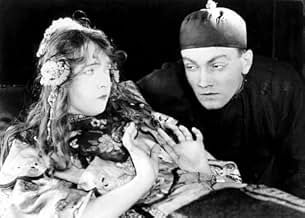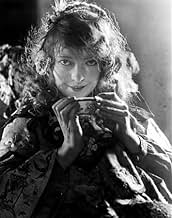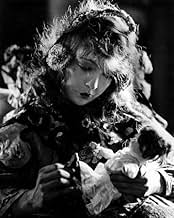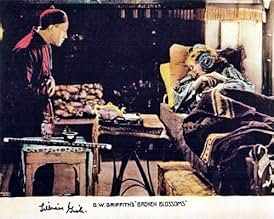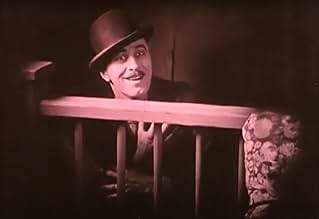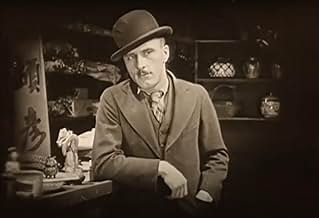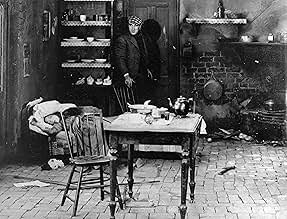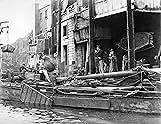IMDb RATING
7.2/10
12K
YOUR RATING
A frail waif, abused by her brutal boxer father in London's seedy Limehouse District, is befriended by a sensitive Chinese immigrant with tragic consequences.A frail waif, abused by her brutal boxer father in London's seedy Limehouse District, is befriended by a sensitive Chinese immigrant with tragic consequences.A frail waif, abused by her brutal boxer father in London's seedy Limehouse District, is befriended by a sensitive Chinese immigrant with tragic consequences.
- Director
- Writers
- Stars
- Awards
- 1 win total
Lillian Gish
- Lucy - The Girl
- (as Miss Lillian Gish)
Richard Barthelmess
- Cheng Huan - The Yellow Man
- (as Mr. Richard Barthelmess)
Edward Peil Sr.
- Evil Eye
- (as Edward Peil)
Ernest Butterworth
- Secondary Role
- (uncredited)
Frederic Hamen
- Secondary Role
- (uncredited)
Wilbur Higby
- London Policeman
- (uncredited)
Man-Ching Kwan
- Buddhist Monk
- (uncredited)
Bobbie Mack
- Ringside Employee
- (uncredited)
Moy Ming
- Minor Role
- (uncredited)
Steve Murphy
- Fight Spectator
- (uncredited)
George Nichols
- Police Constable
- (uncredited)
Karla Schramm
- Burrows' Girlfriend
- (uncredited)
Bessie Wong
- Girl in China
- (uncredited)
- Director
- Writers
- All cast & crew
- Production, box office & more at IMDbPro
Featured reviews
Following the elaborate spectacles that were "The Birth of a Nation" and "Intolerance" D.W. Griffith seemed to have the formula intact for success. With broad sets, hundreds of extras, three hour epics, and tales told over years and even millenniums in the case of "Intolerance," the 90 minute "Broken Blossoms" would seem to have a handicap of sorts. It is but a simple morality tale involving three people that goes horribly awry. But true to Griffith form it works...and it works nearly perfect.
Gone are the visions of what formed countries, what creates intolerance, and the climaxes involving hundreds of people. "Broken Blossoms" is a mere story of forbidden love if such occurrences can actually be called "mere." And although the sets used to portray the foggy gloom and forbidding darkness of London's Limehouse district were indeed expensive, this was a film carried by its only three stars and one that relies totally on the telling of a story.
Richard Barthelmess plays Cheng Huan, a Buddhist missionary who now takes residence in Limehouse. His original intentions, to help the violent Anglo-Saxons understand pacifism, are subverted by his opium addiction. He runs a small shop in the fog of the city and it becomes his own depressed microcosmic world. The stunning Lilian Gish, who seemingly has no bounds as an actress or as an object of feminine beauty, plays Lucy, the daughter of an abusive alcoholic boxer. Donald Crisp plays this part so well that the lack of sound does not inhibit the volume of cruelty he enforces on his only daughter, nor our ability to feel her level of sheer pain and suffering.
Although all three of them may technically may be viewed as broken and products of their own respective worlds, when those worlds clash with each other and tragedy seems more likely, it is Gish who steals the show. Especially under Griffith's direction. And while Griffith may have already given the cinema more than its fair share of technological nuances with his first two features, he still manages to find subtle bits of direction that affect one's viewing of this sordid triangle: Gish's physical inability to smile and her seeking of solitude in something as simple as a flower cannot be emphasized enough as the film goes along.
Political historians may note that Griffith is up to his usual tricks of racism as it is portrayed in the Asian who is played by the white Barthelmess but this is unfounded. If anything, his character is uplifting, or at least attempts to be. One gets the feeling that his race does not impact the story's eventual ending despite what Crisp may bellow while drunk. Crisp's pleasure comes from Gish's pain and anyone, regardless of race, that tried to interfere would not have caused any sort of behavior change. Of course the Asian stereotypes of pacifism, opium addiction, and flowery imagery are played up to some degree but one can hardly argue over the degree of truth in them more than the story's beginning that sees drunken sailors duking it out at the shipyards over next to nothing. And it allows the film to have its ironic coda to boot.
In more detailed film classes, "Broken Blossoms" will get its share of time but overall Griffith will always have "Birth of a Nation" and "Intolerance" printed boldly next to his name with this film being more of a footnote. That is unfortunate because it stands up well for the time, involves excellent early character acting, and hits us closer to home...and to our heart.
The nutshell: I still believe this should be required viewing. The bigness of Griffith may be gone but he has aptly replaced it by creating atmosphere both in terms of environment and in people. The small story of insignificant lives trapped by their own measures suits Griffith, Gish, and Crisp extremely well...9/10.
Gone are the visions of what formed countries, what creates intolerance, and the climaxes involving hundreds of people. "Broken Blossoms" is a mere story of forbidden love if such occurrences can actually be called "mere." And although the sets used to portray the foggy gloom and forbidding darkness of London's Limehouse district were indeed expensive, this was a film carried by its only three stars and one that relies totally on the telling of a story.
Richard Barthelmess plays Cheng Huan, a Buddhist missionary who now takes residence in Limehouse. His original intentions, to help the violent Anglo-Saxons understand pacifism, are subverted by his opium addiction. He runs a small shop in the fog of the city and it becomes his own depressed microcosmic world. The stunning Lilian Gish, who seemingly has no bounds as an actress or as an object of feminine beauty, plays Lucy, the daughter of an abusive alcoholic boxer. Donald Crisp plays this part so well that the lack of sound does not inhibit the volume of cruelty he enforces on his only daughter, nor our ability to feel her level of sheer pain and suffering.
Although all three of them may technically may be viewed as broken and products of their own respective worlds, when those worlds clash with each other and tragedy seems more likely, it is Gish who steals the show. Especially under Griffith's direction. And while Griffith may have already given the cinema more than its fair share of technological nuances with his first two features, he still manages to find subtle bits of direction that affect one's viewing of this sordid triangle: Gish's physical inability to smile and her seeking of solitude in something as simple as a flower cannot be emphasized enough as the film goes along.
Political historians may note that Griffith is up to his usual tricks of racism as it is portrayed in the Asian who is played by the white Barthelmess but this is unfounded. If anything, his character is uplifting, or at least attempts to be. One gets the feeling that his race does not impact the story's eventual ending despite what Crisp may bellow while drunk. Crisp's pleasure comes from Gish's pain and anyone, regardless of race, that tried to interfere would not have caused any sort of behavior change. Of course the Asian stereotypes of pacifism, opium addiction, and flowery imagery are played up to some degree but one can hardly argue over the degree of truth in them more than the story's beginning that sees drunken sailors duking it out at the shipyards over next to nothing. And it allows the film to have its ironic coda to boot.
In more detailed film classes, "Broken Blossoms" will get its share of time but overall Griffith will always have "Birth of a Nation" and "Intolerance" printed boldly next to his name with this film being more of a footnote. That is unfortunate because it stands up well for the time, involves excellent early character acting, and hits us closer to home...and to our heart.
The nutshell: I still believe this should be required viewing. The bigness of Griffith may be gone but he has aptly replaced it by creating atmosphere both in terms of environment and in people. The small story of insignificant lives trapped by their own measures suits Griffith, Gish, and Crisp extremely well...9/10.
D.W.Griffith returns for another one and it would appear that he was still fighting with the demons left over from A Birth of a Nation (1915). He again tried to deal with the fires of racism, but this time with a love story and another appearance by Lillian Gish, in Broken Blossoms (1919). This film's title is actually "Broken Blossoms or the Yellow Man and the Girl". "Yellow Man" refers to the Asian man, Cheng Huan, who falls in love with Gish's Lucy. Right off the bat we get exposed to old time racist terms. The "C" word makes an appearance too. But, Griffith does use this film as a tool to teach a lesson to those who are evil or just plain bad.
It covers a lot of domestic/controversial issues, such as, interracial relationships, child abuse, racism and bullying. It is a hope that this film was the first stepping stone to finding tolerance in the world. It also is a telling lesson about, no matter how civilized you are, you can still do a lot of wrong. Huan (Barthelmess), leaves his homeland to go to England to spread the wisdom of the Buddha to the West and the Anglo-Saxons. It is the biggest mistake he would make in his life. It is a telling story about how the good guy finishes last. The man who comes to the civilized world to try and help make those people better, finds out that he is in the wrong place at the wrong time and nothing but torment befalls him.
Huan assigns himself the job to look after a young woman (Gish), who is terrorized and beaten by her boxer father (Crisp), on a daily basis. Huan has to deal with snitches and liars who align themselves with the evil boxer and in the end finds himself falling into the same dark abyss that he tried to teach others to stay away from. This is an amazing story and has been told many times since, but being that this is a pioneering effort, makes it all the more powerful. True, there are parts that are slow and even boring, but it is that tense situation that starts to build and build until the terrifying and sad end.
8.1 (B MyGrade) = 8 IMDB
It covers a lot of domestic/controversial issues, such as, interracial relationships, child abuse, racism and bullying. It is a hope that this film was the first stepping stone to finding tolerance in the world. It also is a telling lesson about, no matter how civilized you are, you can still do a lot of wrong. Huan (Barthelmess), leaves his homeland to go to England to spread the wisdom of the Buddha to the West and the Anglo-Saxons. It is the biggest mistake he would make in his life. It is a telling story about how the good guy finishes last. The man who comes to the civilized world to try and help make those people better, finds out that he is in the wrong place at the wrong time and nothing but torment befalls him.
Huan assigns himself the job to look after a young woman (Gish), who is terrorized and beaten by her boxer father (Crisp), on a daily basis. Huan has to deal with snitches and liars who align themselves with the evil boxer and in the end finds himself falling into the same dark abyss that he tried to teach others to stay away from. This is an amazing story and has been told many times since, but being that this is a pioneering effort, makes it all the more powerful. True, there are parts that are slow and even boring, but it is that tense situation that starts to build and build until the terrifying and sad end.
8.1 (B MyGrade) = 8 IMDB
Many people believe the best Griffith film is "Intolerance"; some stand by "Way Down East" and still others believe in "Birth of a Nation" despite all its problems. However, I think "Broken Blossoms" is the Griffith film which stands the test of time and still rings true today, over 83 years from its debut.
"Broken Blossoms" is the story of two wounded, abused, seemingly hopeless individuals who find comfort and strength in one another. The Chinaman (played by Richard Barthelmess) and little Lucy Burrows (played by Lillian Gish) are as different as night is to day, however they complement each other and give each other what the other needs; Lucy gives the Chinaman respect as a human being, he in turn gives Lucy affection and love.
What happens to the two souls is, in my opinion, one of the most heartbreaking turn of events ever filmed. The brutal treatment of Lucy by her father and the ultimate sadness of the Chinaman at the end of the film always reduce me to tears.
Those who believe that silent movies are inferior to today's craft really needs to see "Broken Blossoms" and open their hearts and minds to a world that is beyond beauty and beyond pain.
"Broken Blossoms" is the story of two wounded, abused, seemingly hopeless individuals who find comfort and strength in one another. The Chinaman (played by Richard Barthelmess) and little Lucy Burrows (played by Lillian Gish) are as different as night is to day, however they complement each other and give each other what the other needs; Lucy gives the Chinaman respect as a human being, he in turn gives Lucy affection and love.
What happens to the two souls is, in my opinion, one of the most heartbreaking turn of events ever filmed. The brutal treatment of Lucy by her father and the ultimate sadness of the Chinaman at the end of the film always reduce me to tears.
Those who believe that silent movies are inferior to today's craft really needs to see "Broken Blossoms" and open their hearts and minds to a world that is beyond beauty and beyond pain.
The subjects this film deals with are ugly, but the whole thing is done in a beautiful way.
Subjects dealt with are racism, poverty and the reasons why.
The way Griffith deals with these subjects is the contrasts settings. Look at the room above the Chinaman's shop: opulent, festooned with the finest oriental silk. Compare that with the stark squalor of the abode of Lucy and her bruiser of a father. Then there is the education and sophistication of the orientals compared to the simplistic, ill-thought-out racial prejudice of Battling and his cronies.
I also enjoyed the boxing match. Very realistic - not the fantastic nonsense of your Rocky-type bout where a man all but beaten to a jelly suddenly pulls some heavy punches from nowhere and wins the fight.
The acting, as has been mentioned elsewhere, is terrific from all three of the principal characters. Also, their characters are well-drawn. Even Battling Burrows - complete with cauliflower ear - is more than a mere heavy: he boxes for a living, he drinks, he lives in a slum with few worldly possessions. Why?
I find it hard to believe that the films they make nowadays are nowhere near as good as this. Whatever happened to progress?
This film spawned the famous song "Limehouse Blues."
Subjects dealt with are racism, poverty and the reasons why.
The way Griffith deals with these subjects is the contrasts settings. Look at the room above the Chinaman's shop: opulent, festooned with the finest oriental silk. Compare that with the stark squalor of the abode of Lucy and her bruiser of a father. Then there is the education and sophistication of the orientals compared to the simplistic, ill-thought-out racial prejudice of Battling and his cronies.
I also enjoyed the boxing match. Very realistic - not the fantastic nonsense of your Rocky-type bout where a man all but beaten to a jelly suddenly pulls some heavy punches from nowhere and wins the fight.
The acting, as has been mentioned elsewhere, is terrific from all three of the principal characters. Also, their characters are well-drawn. Even Battling Burrows - complete with cauliflower ear - is more than a mere heavy: he boxes for a living, he drinks, he lives in a slum with few worldly possessions. Why?
I find it hard to believe that the films they make nowadays are nowhere near as good as this. Whatever happened to progress?
This film spawned the famous song "Limehouse Blues."
10drpax
"In this scarlet house of sin, does he ever hear the temple bells?" Broken Blossoms is the movie I use to introduce people to silent film who only know it from Chaplin shorts or Birth of a Nation. It is one of the most sensitive movies ever made, in my opinion, and is usually overlooked in any top 100 movie listing. I fear the oversight is due to the listers not having actually seen it.
The version I have--which is now sadly out of print--is the Thames Video version with Lillian Gish's introduction. It is also the one with the original Louis Gotshalk score, pieces of which are sometimes heard on other versions, but the impact of the full orchestral Gotshalk score is overwhelming on an already exquisite film. If you have a chance to see this version, by all means do so.
In answer to a question in another posting, the movie WAS originally tinted--it was part of the "epic poetry" attempt and was quite common with a lot of Griffith work--even back to "A Corner in Wheat".
While I am an immense Gish fan, a lot has already been said about Miss Lillian in the other comments, so I will concentrate on Dick Bartlemess as Chen Huan. The quote above accompanied by his sad look as he leans against the wall of his curio shop tell it all: wrecked youthful enthusiasm--his despair only temporarily abated by the "pipe" in the Limehouse opium dens. His dreams of youth, all packed away in his garret, are only brought out when the one thing that gives him hope that is goodness amidst all the squalor stumbles into his shop.
Only after Lucy arrives can Chen Huan allow himself to dream--to return to golden days of learning, beauty and goodness and ideals. He literally places his dreams of his lost youth on the trembling body of Lucy, but it such a pristine ideal he dare not "defame" it, or it too will disappear like all his other dreams. He must observe it from afar--almost ephemeral. He knows what Hell is like (even before he was shown the booklet by the Christian Brothers). His hell is his lost heart, his lost love. "Bits and pieces of his shattered life." Almost invariably when I find someone to share the movie with me, they are amazed how well it is made and how well it's core story stands up to today. The particulars of Chinese, Cockney and London are not the point; it is a story of hope and despair, of lovers and dreamers. A mature story for a mature audience.
I often wonder if it could be made today. As open as we think we are, I wonder if the basic story could be told again. No matter--it's been told--excellently
The version I have--which is now sadly out of print--is the Thames Video version with Lillian Gish's introduction. It is also the one with the original Louis Gotshalk score, pieces of which are sometimes heard on other versions, but the impact of the full orchestral Gotshalk score is overwhelming on an already exquisite film. If you have a chance to see this version, by all means do so.
In answer to a question in another posting, the movie WAS originally tinted--it was part of the "epic poetry" attempt and was quite common with a lot of Griffith work--even back to "A Corner in Wheat".
While I am an immense Gish fan, a lot has already been said about Miss Lillian in the other comments, so I will concentrate on Dick Bartlemess as Chen Huan. The quote above accompanied by his sad look as he leans against the wall of his curio shop tell it all: wrecked youthful enthusiasm--his despair only temporarily abated by the "pipe" in the Limehouse opium dens. His dreams of youth, all packed away in his garret, are only brought out when the one thing that gives him hope that is goodness amidst all the squalor stumbles into his shop.
Only after Lucy arrives can Chen Huan allow himself to dream--to return to golden days of learning, beauty and goodness and ideals. He literally places his dreams of his lost youth on the trembling body of Lucy, but it such a pristine ideal he dare not "defame" it, or it too will disappear like all his other dreams. He must observe it from afar--almost ephemeral. He knows what Hell is like (even before he was shown the booklet by the Christian Brothers). His hell is his lost heart, his lost love. "Bits and pieces of his shattered life." Almost invariably when I find someone to share the movie with me, they are amazed how well it is made and how well it's core story stands up to today. The particulars of Chinese, Cockney and London are not the point; it is a story of hope and despair, of lovers and dreamers. A mature story for a mature audience.
I often wonder if it could be made today. As open as we think we are, I wonder if the basic story could be told again. No matter--it's been told--excellently
Did you know
- TriviaThe film was produced by D.W. Griffith for Adolph Zukor's Artcraft company, a subsidiary of Paramount Pictures. However, when Griffith delivered the final print of the film to Zukor, the producer was outraged. "How dare you deliver such a terrible film to me!" Zukor raged. "Everybody in the picture dies!" Infuriated, Griffith left Zukor's office and returned the next day with $250,000 in cash, which he threw on Zukor's desk. "Here," Griffith shouted, "If you don't want the picture, I'll buy it back from you." Zukor accepted the offer, thus making this the first film released by United Artists, the production company formed in 1919 by Mary Pickford, Charles Chaplin, Douglas Fairbanks, and Griffith. It was a remarkably successful film, both critically and at the box office.
- GoofsThe intertitles state, "The Buddha says, 'What thou dost not want others to do thee, do thou not to others.'" It was actually not the Buddha but Confucius' teaching.
- Quotes
Lucy Burrows: Don't do it, Daddy! You'll hit me once too often - and then they'll - they'll hang yer!
- ConnectionsFeatured in The Philco Television Playhouse: The Birth of the Movies (1951)
- How long is Broken Blossoms?Powered by Alexa
Details
Box office
- Budget
- $88,000 (estimated)
- Runtime1 hour 30 minutes
- Sound mix
- Aspect ratio
- 1.33 : 1
Contribute to this page
Suggest an edit or add missing content


